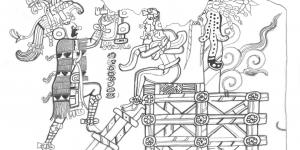You are here
How Are Acts of Service Related to Wisdom?

Mosiah 2:17
Context and Content
King Benjamin was one of the greatest kings among the Nephites,1 and his address to his people, found in Mosiah 2–6, has been praised as one of the greatest religious speeches in all of recorded history.2 In his speech, King Benjamin joined the concepts of wisdom and service into what has become a famous and oft-quoted scriptural passage: “And behold, I tell you these things that ye may learn wisdom; that ye may learn that when ye are in the service of your fellow beings ye are only in the service of your God” (Mosiah 2:17).
Like Nephi, who was the first king of the Nephites,3 King Benjamin drew upon the themes and teachings of ancient wisdom writings in order to properly instruct his people.4 He invited them to “open your ears that ye may hear, and your hearts that ye may understand, and your minds that the mysteries of God may be unfolded to your view” (Mosiah 2:9). This statement echoes Proverbs 2:2, which instructs the hearer to “incline thine ear unto wisdom, and apply thine heart to understanding.”5
These teachings indicate that divine wisdom is only received through revelation or inspiration, and that those who seek wisdom must first humbly prepare their hearts and minds to receive counsel and direction. The need for adequate spiritual preparation may have been especially needful in regard to King Benjamin’s wise teachings about service. Because he was their king, some of his people may have been startled or offended at his rejection—and even reversal—of royal privileges.6
Doctrinal Mastery Mosiah 2:17 Infographic by Book of Mormon Central
King Benjamin was the greatest and most prominent individual in Nephite society, and kings in pre-Columbian America and other ancient civilizations were often regarded as divine rulers.7 Yet Benjamin insisted that he was no “more than a mortal man” (Mosiah 2:10). In fact, he saw kingship as a duty to serve his people “with all the might, mind and strength which the Lord hath granted unto me” (v. 11). He refused to tax his people for his own gain, and instead said he “labored with mine own hands that I might serve you” (v. 14). In contrast to worldly conceptions of status and privilege, King Benjamin’s pattern of service exemplified the Savior’s teaching that the “greatest among you shall be your servant” (Matthew 23:11).8
In order to convey this profound truth and to show how giving and receiving service naturally leads to gratitude, King Benjamin used a form of parallelism called gradation. As each successive line repeats a key word or phrase from the previous line, this literary technique creates a “continuation of thought” and links related concepts into “an inseparable body”9:
And behold, I tell you these things
that ye may learn wisdom;
that ye may learn that when ye are in the
service of your fellow beings ye are only in the
service of your God. Behold, ye have called me
your king; and if I, whom ye call
your king, do
labor to serve you, then ought not ye to
labor to serve one another? And behold also, if I, whom ye call your king, who has spent his days in your
service, and yet has been in the
service of God, do merit any
thanks from you, O how you ought to
thank your heavenly King! (Mosiah 2:17–19)10
It is also notable that King Benjamin’s counsel about service in Mosiah 2 is only the first part of a three-stage teaching, which proceeds as follows:
- All service is merely service to God (Mosiah 2:17).
- But no matter how much we serve God, we remain unprofitable servants (Mosiah 2:21).
- We do not serve God to get ahead with God or man, but to know the voice by which we are called (Mosiah 5:13).11
These principles of service transcend worldly goals for status, recognition, and gain—replacing them with a motive to truly know God and come unto Christ.
Doctrines and Principles
King Benjamin’s teachings offer profound and wise insights into the meaning and purpose of service. Unlike King Noah, who lived lavishly and burdened his people with heavy taxes,12 Benjamin used his royal authority and influence to bless those who had appointed him to be their king.13 He didn’t let his power, wealth, or status alter his humble pattern of service.
President Dieter F. Uchtdorf warned that “when we become obsessed with our status; when we focus on our own importance, power, or reputation; when we dwell upon our public image and believe our own press clippings—that’s when the trouble begins; that’s when pride begins to corrupt.”14 Inspired and consistent patterns of service can act as a formidable barrier to the temptations of pride and greed.
King Benjamin also taught that the Lord Himself comprehends and feels the effects of genuine and heartfelt acts of service, no matter who their earthly recipients might be, for “when ye are in the service of your fellow beings ye are only in the service of your God” (Mosiah 2:17). Jesus similarly declared this principle to His disciples in the New Testament, stating, “Inasmuch as ye have done it unto one of the least of these my brethren, ye have done it unto me” (Matthew 25:40).
These statements can perhaps be taken more literally than some realize, for Christ truly “suffered the pains of all men, yea, the pains of every living creature, both men, women, and children, who belong to the family of Adam” (2 Nephi 9:21).15 King Benjamin prophesied that “blood cometh from every pore, so great shall be his anguish for … his people” (Mosiah 3:7). For good or ill, the way that individuals and communities treat one another is the way that they treat Jesus Christ.
When these powerful truths are embedded deep within the heart, every mortal relationship and interaction can be seen in a new light. President Boyd K. Packer taught, “In one sense we ourselves may participate in an atonement. When we are willing to restore to others that which we have not taken, or heal wounds that we did not inflict, or pay a debt that we did not incur, we are emulating His part in the Atonement.”16 Those who open themselves to divine wisdom will see how the Atonement of Christ and His universal relationship with mankind infuse every act of service with profound and eternal meaning.
Further Reading
President Dieter F. Uchtdorf, “The Why of Priesthood Service,” Ensign, May 2012, 58–61, online at lds.org.
Elder M. Russell Ballard, “Finding Joy through Loving Service,” Ensign, May 2011, 46–49, online at lds.org.
Elder Dallin H. Oaks, “Unselfish Service,” Ensign, May 2009, 93–96, online at lds.org.
- 1. John W. Welch, “Benjamin, the Man: His Place in Nephite History,” in King Benjamin’s Speech: ‘That Ye May Learn Wisdom’,” ed. John W. Welch and Stephen D. Ricks (Provo, UT: FARMS, 1998), 23. See also, Taylor Halverson, “Deuteronomy 17:14–20 as Criteria for Book of Mormon Kingship,” Interpreter: A Journal of Mormon Scripture 24 (2017): 1–10.
- 2. John W. Welch and Stephen D. Ricks, “Introduction,” in King Benjamin’s Speech, ix.
- 3. For Nephi’s perpetuation of wisdom writings among his people, see Book of Mormon Central, “Why Did Nephi Work So Hard to Preserve the Wisdom He Had Received? (1 Nephi 6:5–6),” KnoWhy 262 (January 16, 2017). See also, Taylor Halverson, “Reading 1 Nephi with Wisdom,” Interpreter: A Journal of Mormon Scripture 22 (2016): 279–293; Kevin Christensen, “The Temple, the Monarchy, and Wisdom: Lehi’s World and the Scholarship of Margaret Barker,” in Glimpses of Lehi’s Jerusalem, eds. John W. Welch, David Rolph Seely, and Jo Ann H. Seely (Provo, UT: FARMS, 2004), 449–522.
- 4. See Alyson Skabelund Von Feldt, “‘His Secret Is with the Righteous’: Instructional Wisdom in the Book of Mormon,” FARMS Occasional Papers 5 (2007): 67–71.
- 5. For a chart that details this and other themes shared between Proverbs 1–9 and King Benjamin’s speech in Mosiah 2–6, see Feldt, “‘His Secret Is with the Righteous,’” 70.
- 6. For the extent of King Benjamin’s innovations regarding kingship, see Book of Mormon Central, “How Did King Benjamin’s Speech Lead to Nephite Democracy? (Mosiah 29:32),” KnoWhy 301 (April 17, 2017); John W. Welch, “Democratizing Forces in King Benjamin’s Speech,” in Pressing Forward with the Book of Mormon: The FARMS Updates of the 1990s, ed. John W. Welch and Melvin J. Thorne (Provo, UT: FARMS, 1999), 110–126.
- 7. See Brant A. Gardner, Traditions of the Fathers: The Book of Mormon as History (Salt Lake City, UT: Greg Kofford Books, 2015), 267.
- 8. For a historical and literary treatment of servants in Christ’s New Testament parables, see Mary Ann Beavis, “Ancient Slavery as an Interpretive Context for the New Testament Servant Parables with Special Reference to the Unjust Steward (Luke 16:1–8),” Journal of Biblical Literature 111, no. 1 (1992): 37–54.
- 9. See Donald W. Parry, Poetic Parallelisms in the Book of Mormon: The Complete Text Reformatted (Provo, UT: Neal A. Maxwell Institute for Religious Scholarship, 2007), xxvi.
- 10. Formatting follows Parry, Poetic Parallelisms in the Book of Mormon, 161. For further information regarding King Benjamin’s use of poetic parallels, see Book of Mormon Central, “Why Did King Benjamin Use Poetic Parallels So Extensively? (Mosiah 5:11),” KnoWhy 83 (April 21, 2016).
- 11. From John W. Welch and J. Gregory Welch, Charting the Book of Mormon: Visual Aids for Personal Study and Teaching (Provo, UT: FARMS, 1999), chart 86. For a more extended analysis of King Benjamin’s three-part teachings on service, see John W. Welch, “Benjamin's Speech: A Masterful Oration,” in King Benjamin’s Speech, 66–69.
- 12. For information about Noah’s decadent lifestyle, see Mosiah 11:1–15. If Noah’s manner of kingship was typical of the larger complex of societies that surrounded the Nephites, then King Benjamin’s example of humble service may have been quite unique. See Book of Mormon Central, “What Did it Mean to be ‘King Over All the Land’? (Alma 20:8),” KnoWhy 128 (June 23, 2016); Gordon C. Thomasson, “Mosiah: The Complex Symbolism and Symbolic Complex of Kingship in the Book of Mormon,” Journal of Book of Mormon Studies 2, no. 1 (1993): 32–36; Book of Mormon Central, “Why is the Theme of Kingship So Prominent in King Benjamin's Speech? (Mosiah 1:10),” KnoWhy 79 (April 15, 2016); Neal Rappleye, “King Noah and Maya Kingship,” at Studio et Quoque Fide: A Blog on Latter-day Saint Apologetics, Scholarship, and Commentary, August 21, 2016, online at studioetquoquefide.com; Lee L. Donaldson, “Benjamin and Noah: The Principle of Dominion” in Mosiah, Salvation Only Through Christ, Book of Mormon Symposium Series, Volume 5, ed. Monte S. Nyman and Charles D. Tate, Jr. (Provo UT: Religious Studies Center, Brigham Young University, 1991), 49–58.
- 13. To the early Saints in this dispensation, the Lord declared, “For of him unto whom much is given much is required” (Doctrine and Covenants 82:3). King Benjamin’s righteous example of service aptly demonstrates this principle.
- 14. President Dieter F. Uchtdorf, “Pride and the Priesthood,” Ensign, November 2010, 55–58, online at lds.org.
- 15. For a deeper understanding of Christ’s Atonement and the nature of His suffering, see Elder Dallin H. Oaks, “Strengthened by the Atonement of Jesus Christ,” Ensign, November 2015, 61–64, online at lds.org.
- 16. President Boyd K. Packer, “The Brilliant Morning of Forgiveness,” Ensign, November 1995, online at lds.org.
KnoWhy Citation
Related KnoWhys
Subscribe
Get the latest updates on Book of Mormon topics and research for free






